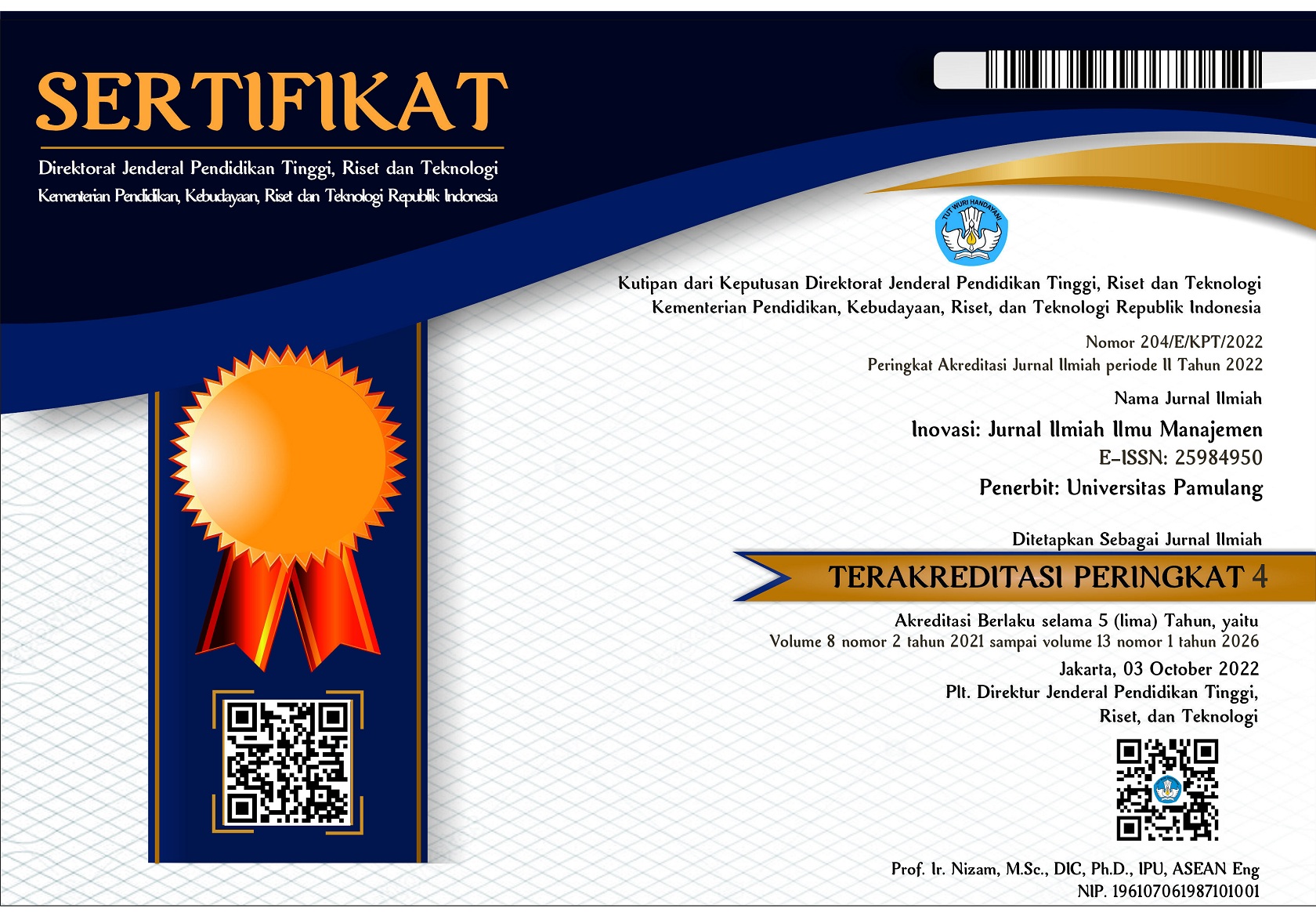Pengaruh Healthcare Supply Chain Risk Management, Healthcare Supply Chain 4.0, Healthcare Supply Chain Integration dan Healthcare Supply Chain Performance terhadap Business Performance pada Industri Kesehatan di Wilayah Jabotabek
DOI:
https://doi.org/10.32493/Inovasi.v11i2.p277-290.42423Abstract
Penelitian ini menginvestigasi hubungan antara Healthcare Supply Chain 4.0 dan kinerja rantai pasok kesehatan (Healthcare Supply Chain Performance), serta dampaknya terhadap kinerja bisnis. Hasil pengujian menunjukkan adanya pengaruh signifikan dari Healthcare Supply Chain 4.0 terhadap Healthcare Supply Chain Performance. Namun, tidak ditemukan pengaruh Healthcare Supply Chain Risk Management dan Healthcare Supply Chain Integration terhadap Healthcare Supply Chain Performance. Selain itu, kinerja rantai pasok kesehatan berpengaruh positif terhadap kinerja bisnis. Temuan lain mengidentifikasi bahwa indikator terendah dari kinerja rantai pasok terkait dengan gangguan yang mempengaruhi kelancaran rantai pasok, seperti bencana atau kejadian tak terduga. Oleh karena itu, perusahaan disarankan untuk mencari alternatif pemasok dan meningkatkan komunikasi dengan pemasok serta pelanggan guna memitigasi risiko gangguan rantai pasok.
References
Chen, H. L. (2018). Supply chain risk’ s impact on corporate financial performance. 38(3), 713–731. https://doi.org/10.1108/IJOPM-02-2016-0060
Chiarini, A., & Vagnoni, E. (2016). Environmental sustainability in European public healthcare: could it just be a matter of leadership? Leadership in Health Services, 29(1), 2–8.
Dolgui, A., Ivanov, D., & Rozhkov, M. (2020). Does the ripple effect influence the bullwhip effect? An integrated analysis of structural and operational dynamics in the supply chain†. International Journal of Production Research, 58(5), 1285–1301. https://doi.org/10.1080/00207543.2019.1627438
Flynn, B. B., Koufteros, X., & Lu, G. (2016). On theory in supply chain uncertainty and its implications for supply chain integration. Journal of Supply Chain Management, 52(3), 3–27.
Flynn, B. B., Koufteros, X., & Lu, G. (2016). On theory in supply chain uncertainty and its implications for supply chain integration. Journal of Supply Chain Management, 52(3), 3–27.
Friday, D., Ryan, S., & Sridharan, R. (2018). Collaborative risk management : a systematic literature review. 48(3), 231–253. https://doi.org/10.1108/IJPDLM-01-2017-0035
Hair, J. F., Risher, J. J., Sarstedt, M., & Ringle, C. M. (2019). When to use and how to report the results of PLS-SEM. European Business Review, 31(1), 2–24.
Hallikas, J., & Lintukangas, K. (2016). Purchasing and supply: An investigation of risk management performance. International Journal of Production Economics, 171, 487–494.
Ho, L.-H., & Chang, P.-Y. (2015). INNOVATION CAPABILITIES, SERVICE CAPABILITIES AND CORPORATE PERFORMANCE IN LOGISTICS SERVICES. International Journal of Organizational Innovation, 7(3).
Iftikhar, A., Purvis, L., & Giannoccaro, I. (2021). A meta-analytical review of antecedents and outcomes of firm resilience. Journal of Business Research, 135(December 2020), 408–425. https://doi.org/10.1016/j.jbusres.2021.06.048
Kim, H. K., & Lee, C. W. (2021). Relationships among healthcare digitalization, social capital, and supply chain performance in the healthcare manufacturing industry. International Journal of Environmental Research and Public Health, 18(4), 1417.
Macedo, A., Senna, P., Monteiro, A., & Pinha, D. (2016). STUDY ON TECHNIQUES AND TOOLS USED IN LEAN HEALTHCARE IMPLEMENTATION : A LITERATURE REVIEW. 13, 406–420. https://doi.org/10.14488/BJOPM.2016.v13.n4.a1
Mancheri, N. A., Sprecher, B., Bailey, G., Ge, J., & Tukker, A. (2019). Effect of Chinese policies on rare earth supply chain resilience. Resources, Conservation and Recycling, 142(November 2018), 101–112. https://doi.org/10.1016/j.resconrec.2018.11.017
MUAFI, M., & KUSUMAWATI, R. A. (2021). Green human resources management and its impact on supply chain and business performance: An empirical study in Indonesia. The Journal of Asian Finance, Economics and Business, 8(5), 1099-1107.
Rakovska, M. A., & Stratieva, S. V. (2018, January). A taxonomy of healthcare supply chain management practices. In Supply Chain Forum: An International Journal (Vol. 19, No. 1, pp. 4-24). Taylor & Francis.
Sekaran, U., & Bougie, R. (2016). Research Methods for Business (7th ed.). Wiley.
Tortorella, G. L., Fogliatto, F. S., Mac Cawley Vergara, A., Vassolo, R., & Sawhney, R. (2020). Healthcare 4.0: trends, challenges and research directions. Production Planning and Control, 31(15), 1245–1260. https://doi.org/10.1080/09537287.2019.1702226
Wong, C. W., Lirn, T. C., Yang, C. C., & Shang, K. C. (2020). Supply chain and external conditions under which supply chain resilience pays: An organizational information processing theorization. International Journal of Production Economics, 226, 107610.
Zhao, N., Hong, J., & Lau, K. H. (2023). Impact of supply chain digitalization on supply chain resilience and performance: A multi-mediation model. International Journal of Production Economics, 259, 108817.
Zhou, H., Wang, Q., & Yang, Q. (2023). How does digitalisation influence supply chain performance? Evidence from a supply chain risk management perspective. International Journal of Logistics Research and Applications, 1–19. https://doi.org/10.1080/13675567.2023.2169667.
Downloads
Published
How to Cite
Issue
Section
License
Authors who publish with this journal agree to the following terms:
- Authors retain copyright and grant the journal right of first publication with the work simultaneously licensed under a Creative Commons Attribution License that allows others to share the work with an acknowledgement of the work's authorship and initial publication in this journal.
- Authors are able to enter into separate, additional contractual arrangements for the non-exclusive distribution of the journal's published version of the work (e.g., post it to an institutional repository or publish it in a book), with an acknowledgement of its initial publication in this journal.
- Authors are permitted and encouraged to post their work online (e.g., in institutional repositories or on their website) prior to and during the submission process, as it can lead to productive exchanges, as well as earlier and greater citation of published work (See The Effect of Open Access).
INOVASI: journal of managenet have CC-BY-SA or an equivalent license as the optimal license for the publication, distribution, use, and reuse of scholarly work.
In developing strategy and setting priorities, INOVASI: JOURNAL OF MANAGEMENT recognize that free access is better than priced access, libre access is better than free access, and libre under CC-BY-SA or the equivalent is better than libre under more restrictive open licenses. We should achieve what we can when we can. We should not delay achieving free in order to achieve libre, and we should not stop with free when we can achieve libre.









